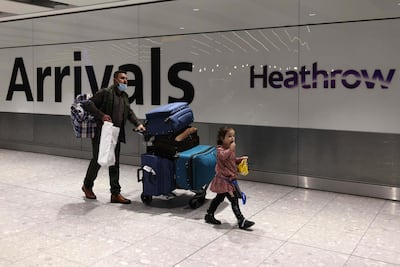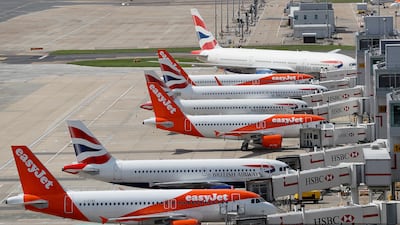Airline bosses expressed cautious optimism on Wednesday that the spread of the Omicron variant would not wreck the industry’s recovery from the coronavirus pandemic.
Many governments have tightened border restrictions because of concerns over the variant, prolonging the measures that have plagued the travel sector since the start of the pandemic.
But speaking at a World Aviation Festival in London, industry leaders said they were better prepared than before and had not seen sharp declines in bookings because of Omicron.
Johan Lundgren, chief executive of easyJet, said some customers had postponed upcoming trips, but said there was hardly any effect on longer-term bookings.
He said it was too early to tell whether the latest developments would hit bookings in December and January, when many people plan their summer holidays.
“It will take six, seven, eight days before it settles in and stabilises,” Mr Lundgren said. “It’s not as severe as what we have seen at previous times when restrictions have been introduced.
“We recognised that the nature of the virus is that it would evolve. Therefore we have been quite cautious in our thinking for the winter.”
The underlying position is still that “we are on a recovery track”, he said.
Some executives had to alter plans for the industry event because of Britain’s new travel restrictions, which came into effect on Tuesday.
People arriving in the UK must now take a PCR test, not a cheaper lateral flow test, and wait for their result before they can leave isolation.
The measures are intended to slow the arrival of Omicron cases in Britain before Christmas. Other European countries have restricted travel from southern Africa, where the strain was first identified.

Robin Hayes, chief executive of JetBlue, urged UK ministers not to make testing prohibitively expensive for travellers.
He suggested that the UK’s 20 per cent sales tax, known as VAT, should be lifted from PCR tests so that consumer prices would be lower.
“I think that the most important thing is to keep borders open and aeroplanes open, and create a testing regime that’s accessible to people,” he said.
With rules constantly changing, passengers are booking flights at ever shorter notice to prevent their plans being knocked off course, airline chiefs said.
“Customers are booking closer and closer in. I feel like every week we are going one day closer to departure,” said Robert Carey, the president of Wizz Air.
“To be honest this has become a little bit par for the course,” he said of the Omicron variant. “We feel pretty excited about where things are. We are dealing with restrictions as they come.”
Industry leaders said they were pleased with the level of demand for transatlantic flights since the US re-opened to Europe last month.
US President Joe Biden said on Tuesday that restrictions could change because of Omicron, but indicated that he would warn European countries in advance if this was about to happen.
“The North Atlantic demand has been really strong,” said Scott Kirby, chief executive of United Airlines. “There’s a big desire for people to reconnect and unite with each other, both business and leisure.”
Some aviation bosses, including Mr Kirby, said the continuing trend of remote working meant that business travel had been slow to resume.
United has found that while many smaller businesses are back to pre-pandemic travel patterns, some larger companies are yet to follow suit.
At JetBlue, business travel is about half of pre-pandemic levels, and is not expected to be back to normal even by the end of next year.
“People don’t need to necessarily travel to have a compelling meeting,” said Amy Burr, the head of JetBlue’s technology investment arm.
“I don’t think that’s going to go away. We have to live with that new normal as an industry.”


